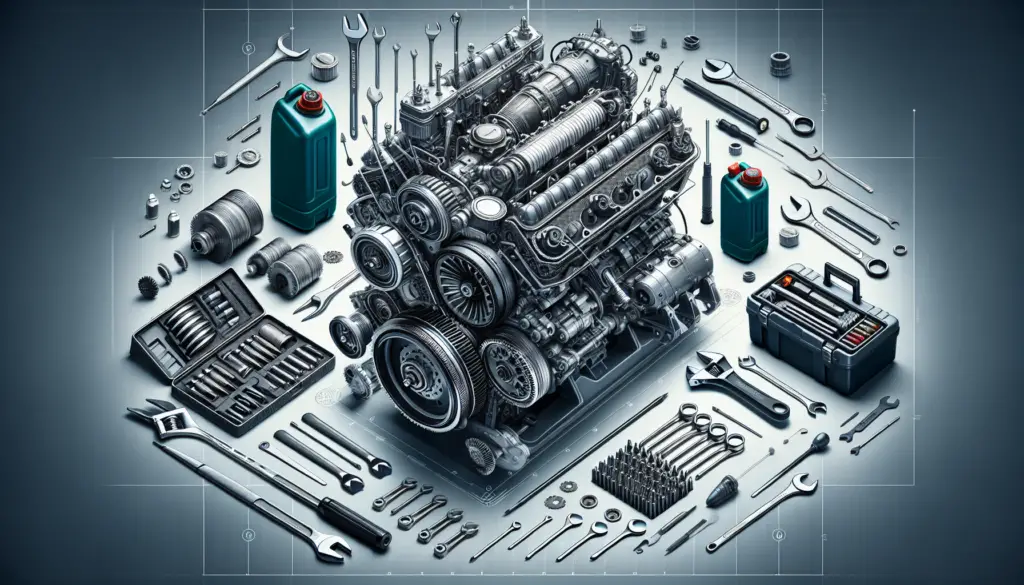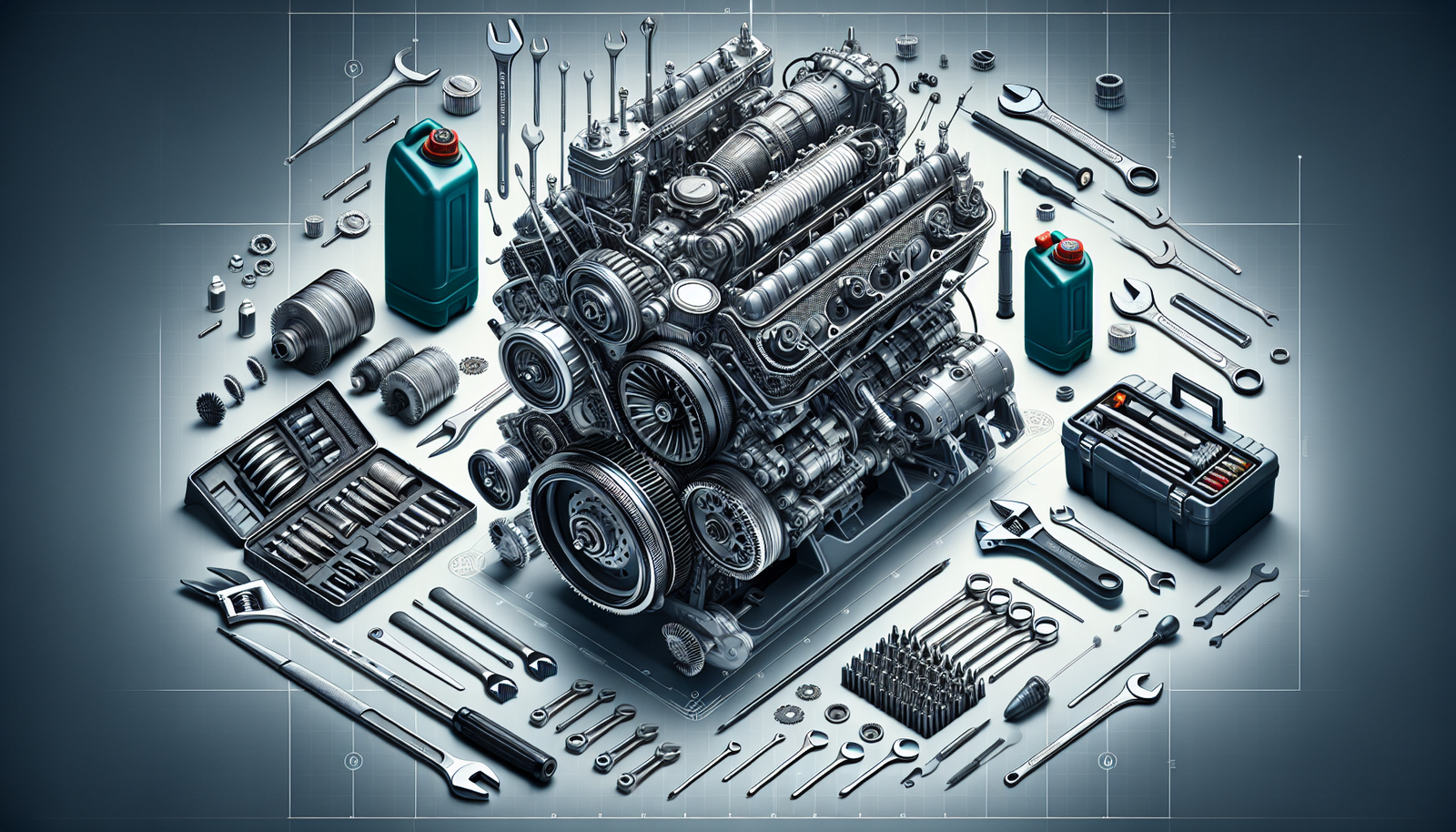Just like your favorite sports car, your boat engine also needs some love and attention to keep it at its peak performance. It’s tempting to assume that since it’s a marine engine, it’s bulletproof – but this can lead you into a hefty repair bill. So, you need to stay on top of maintenance, keep it clean, and use optimal fuel. The article “Top Ways To Improve Performance of Your Boat Engine” is about to take you through the best strategies and practical steps to enhance your boat engine’s effectiveness. After reading this, you’ll be sure to squeeze every ounce of power out of your vessel’s heart and extend its life in the process.
Understand Your Boat Engine
Gaining a thorough understanding of your boat’s engine is the key to ensuring efficient performance and longevity. This process involves knowing your engine’s specifications, understanding its mechanics, and familiarizing yourself with the various parts.
Knowing the specifications
The model, size, and horsepower of your boat engine can tell you a lot about its capacity and efficiency. For example, a high-horsepower engine has more power, but it may also consume more fuel. Knowing the specifications of your engine would help you operate it within its limits and maintain it effectively.
Understanding the mechanics
Understanding how your boat engine works helps you diagnose and troubleshoot problems. Whether it’s a 2-stroke or a 4-stroke engine, knowing the operating principle is valuable. This means understanding how the fuel and air mix, ignite, and push the piston, providing the necessary power to propel your boat.
Familiarizing with the engine parts
Different parts of the engine have different roles in ensuring its smooth operation. Familiarizing yourself with the various parts such as the spark plug, piston, crankshaft, and fuel injector, among others, helps you know exactly where to look when things go wrong.
Regular Engine Maintenance
Regular maintenance is crucial to extending your boat engine’s lifespan and maintaining its optimal performance. The primary steps include scheduling regular servicing, checking and changing oil often, maintaining clean fuel injectors, and changing air filters regularly.
Scheduling consistent servicing
Like any machinery, boat engines require regular servicing to continue performing optimally. Having your boat engine regularly checked by a professional can help detect and fix minor issues before they escalate into costly repairs.
Checking and changing oil regularly
Oil is the lifeblood of your boat engine. It lubricates the moving parts, reducing friction and preventing overheating. Therefore, it’s important to check the oil level regularly and change it as per the manufacturer’s recommendation.
Maintaining clean fuel injectors
Fuel injectors play a critical role in the engine’s operation. They deliver fuel to the engine in exactly the right amount and at the perfect time. Dirty fuel injectors can affect your boat’s performance, fuel economy, and emissions. Regular cleaning or replacement can ensure they operate correctly.
Changing air filters regularly
Air filters prevent harmful debris and impurities from entering the engine. Replacing these filters regularly ensures clean, unblocked airflow, promoting better fuel efficiency and engine performance.

Use High-Quality Fuel
Another way to enhance your boat engine’s performance is by using high-quality fuel.
Understanding different fuel types
There are several types of boat fuels available, including diesel, unleaded gasoline, and mixtures with ethanol. Familiarize yourself with the advantages and drawbacks of each type, so you can choose the one that best suits your boat’s engine needs.
Choosing premium quality fuel
Investing in premium quality fuel can pay off in the long run. High-quality fuel burns cleaner, minimizes engine wear, and promotes efficient fuel consumption. It might cost more, but the benefits it offers in terms of engine longevity and performance are often worth the price.
Avoiding contaminated fuel
Contaminated fuel can clog your fuel injectors, leading to poor engine performance. Regularly checking your fuel for contaminants and emptying and cleaning your fuel tank can help prevent this problem.
Propeller Maintenance
Propellers are vital to your boat’s engine performance. Their condition and performance can significantly impact your boating experience.
Orthow regular checks for Damage
Regularly inspecting your propeller for damage can prevent potential problems. Damaged or bent propeller blades can cause vibration, leading to engine damage over time.
Keeping the Propeller Balanced
An unbalanced propeller can cause excessive vibration, leading to premature wear and tear on the engine. Regular maintenance and repair ensure a balanced propeller, leading to smooth sailing and long engine life.
Choosing the right propeller
Not all propellers are suitable for all boats or engines. It’s important to choose a propeller that’s designed for your specific engine to ensure optimal performance and fuel consumption.

Engine Tuning
Engine tuning allows you to adjust your engine’s parameters to improve performance.
Understanding engine tuning
Engine tuning involves adjusting the fuel and air ratio, ignition timing, and other settings of your engine to optimize its performance. While this process can be complex, it can significantly enhance your boat’s performance.
Importance of professional tuning
Tuning your boat’s engine is a job best left to professionals. Incorrect tuning can lead to poor performance, higher fuel consumption, and even significant engine damage.
Impacts of tuning on performance
Engine tuning can considerably enhance your boat’s speed, acceleration, and fuel efficiency. However, remember that while tuning can improve performance, it should not be seen as a substitute for regular maintenance and servicing.
Avoid Engine Overloading
Overloading your boat can lead to poor performance and potentially serious engine damage.
Understanding your boat’s capacity
Every boat has a weight capacity. Knowing this capacity helps prevent overloading, which can strain the engine and cut fuel efficiency.
Impacts of overloading on the engine
Overloading puts unnecessary stress on the engine and increases fuel consumption. It can lead to overheating, which can damage the engine over time.
Maintaining optimal weight for performance
Loading your boat optimally will optimize engine performance. It involves observing weight distribution guidelines and ensuring that your boat is not carrying too much weight.
Temperature control
Maintaining correct engine operating temperature is critical in preserving engine performance.
Understanding Engine operating temperature
Engines are designed to operate within a specific temperature range. Understanding this range is important to detect anomalies and prevent overheating or undercooling issues.
Maintaining correct cooling system function
The engine’s cooling system helps maintain its optimal operating temperature. Keeping the cooling system in good condition can prevent your engine from overheating and prolong its lifespan.
Impacts of temperature on engine performance
Fluctuations in engine temperature affect its performance. Too much heat can cause the engine to seize, while too little heat can cause it to run inefficiently. Thus, maintaining an appropriate operating temperature is essential.
Use of High-Performance Parts
Maximizing your boat engine’s potential can involve using high-performance parts.
Upgrading your engine parts
Replacing factory-standard parts with high-performance parts can significantly boost your engine’s performance. Make sure these parts are right for your engine to avoid potential problems.
Investing in quality parts
Quality engine parts may cost more, but they provide enhanced performance, increased durability, and longer lifespan.
Impact of high-performance parts on engine
High-performance parts improve engine speed, power, and efficiency. Investing in these parts can be a great way to maximize your boat’s engine performance.
Regular engine inspections
Consistent engine checks can reveal potential issues before they escalate.
Importance of consistent checks
Regular engine inspections can prevent major problems by detecting minor ones early. Implementing a routine engine inspection can save you from costly repairs and performance issues.
Understanding the inspection process
A good understanding of your engine will enable you to perform regular checks effectively. By monitoring the engine’s state, you can address issues before they become severe.
Signs of engine problems during inspection
During inspections, be on the lookout for signs of trouble, such as oil leaks, unusual noises, or vibration. If you notice any of these signs, seek professional help immediately.
Proper Winterization
If you won’t be using your boat during winter, it’s important to winterize your engine.
Understanding the winterization process
Winterization involves preparing your boat’s engine for the winter season. This process includes draining fuel, changing oil, and protecting the engine from the harsh weather.
The importance of winterization
Winterization is crucial in preventing damage to your engine during periods of non-use in the cold winter months. Failure to properly winterize your engine can lead to significant damage and repair costs.
Effects of winterization on engine performance
Proper winterization ensures that your engine is ready to operate efficiently when boating season returns, maintaining its performance and extending its lifespan.
In conclusion, improving your boat engine’s performance involves understanding your boat engine, regular maintenance, using high-quality fuel, propeller maintenance, avoiding engine overloading, and the use of high-performance parts. Taking these steps will ensure you enjoy a smooth and pleasurable boating experience for many years.

